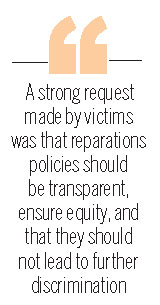
The Office for Reparations Bill was passed with a narrow margin of 59 votes for and 43 votes against, in Parliament on October 11. Much contention around this Act has arisen among civil society groups who claim that the Office for Reparations cannot be truly independent due to its reliance on the approval of the Cabinet of Ministers when formulating policies and guidelines as per (Section 11 (1) (g)). Whether it is ultimately the Cabinet of Ministers or the Commissioners of the Office who will decide regarding granting reparations, there are some key considerations to be made by both these parties. These considerations are about what the victims want.
 The victims of war and conflict are those who have ‘suffered damage as a result of loss of life or damage to their person or property’ (Clause 27a) and having waited so long after the war- are desperately in need of reparations. Not paying heed to their concerns when formulating policies and guidelines, would make the entire process ineffective.
The victims of war and conflict are those who have ‘suffered damage as a result of loss of life or damage to their person or property’ (Clause 27a) and having waited so long after the war- are desperately in need of reparations. Not paying heed to their concerns when formulating policies and guidelines, would make the entire process ineffective.
A strong request made by victims was that reparations policies should be transparent, ensure equity, and that they should not lead to further discrimination (Final Report of the CTF on Reconciliation Mechanisms, 56).
This pressure stems from victims’ previous experiences of receiving reparations which have often proven to be ineffective, inadequate, and discriminatory.
 Many claims were made by victims regarding non-payment and delays in compensation or outright refusal of restitution. Concerns were also raised over the lack of a rationale for compensation with many victims facing discrepancies in the reparations they received, as compared to other similar cases.
Many claims were made by victims regarding non-payment and delays in compensation or outright refusal of restitution. Concerns were also raised over the lack of a rationale for compensation with many victims facing discrepancies in the reparations they received, as compared to other similar cases.
In Trincomalee, a woman who lost her husband in the ethnic violence of 1985 was given one month’s salary with no other compensation while relatives of others who died in the same incident received a pension.
Another discrepancy that was highly criticised was related to disabled soldiers who were categorised based on their disability so that some disabilities received 40% less compensation than others (Final Report of the CTF on Reconciliation Mechanisms, 49).
These concerns raised by victims have been taken into consideration in the formulation of the Reparations Act. Article 12 (1) of the Act states “In formulating Policies on Reparations, and issuing guidelines, the Office for Reparations shall… (c) be guided by the principles of non-discrimination, victim-centrality and fairness…” It is the most vital aspect the Office must pay attention to.
Another key point of focus when formulating policies regarding reparations should be towards groups facing excessive vulnerabilities.
When consulted, many victims pointed out the need for targeted assistance given certain victims’ vulnerable situations (Final Report of the CTF on Reconciliation Mechanisms, 59). This includes women (focusing also on womenheaded households), children, and differently abled or disabled persons. To this end, the Reparations Act sets out that the Office must give “…due consideration to the special needs of women, children and persons with disabilities” (Article 12 (1) (c)).
While the Act contains provisions to meet the demands of the victims and to remedy the inefficiencies and discrepancies of previous reparations processes, this alone is not enough.
A heavy duty lies in the hands of the Commissioners who will soon be appointed to the Office for Reparations, and who will bear the responsibility of meeting these demands when formulating reparations policies and their implementation.
Although the formulated policies are to pass through the Cabinet, this is only as a process of approval and the Cabinet itself has no power to formulate new policies.
However, through the authority to approve or disapprove reparations policies set out by the Office of Reparations, the Cabinet too holds accountability to the victims. To not approve policies that are in the victims’ ‘best interests’, is to deny them the right to rebuild and restore their life back to normalcy.
So, both the Office for Reparations and the Cabinet of Ministers are ultimately responsible; one to formulate effective, non-discriminatory, and fair reparations policies and one to approve policies that are such. Both have a responsibility and a part to play.
If done right, reparations can be a reconciliation project that rebuilds victims’ lives and a social movement that restores the citizens’ trust in the government.
